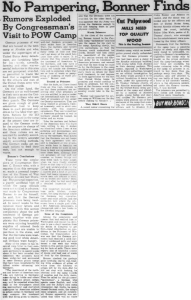Primary Source Set
World War II, Part 2: North Carolina After Pearl Harbor
After Japan’s attack on Pearl Harbor, the United States entered World War II, leading to inevitable change for the nation and for the state of North Carolina. This part of the World War II lesson uses photographs, newspaper articles, scrapbooks, and correspondence to illustrate the significant social and economic effects of the Second World War on North Carolina.
Time Period
1941-1945
Grade Level
Undergraduate
Transcript
"No Pampering, Bonner Finds," The Gates County Index
As World War II raged on, the United States military brought prisoners of war (POWs) to the homefront. The POWs, who were mostly German or Italian, were held at 18 military installations across the state and labored in industries like farming and pulpwood cutting. This article from the Gates County Index describes a visit by Congressman Herbert C. Bonner to the prison of war camp at Ahoskie, which held over 200 German POWs.
Contributed to DigitalNC by Albemarle Regional Library System, Gates County Public Library
Gatesville, N.C. (Gates County)
Background
World War II had raged on for two years when Japanese forces unexpectedly attacked the American naval base at Pearl Harbor on December 7, 1941. While the United States had remained a neutral force during the early years of the war, it was the attack on Pearl Harbor that drew the nation, and North Carolina, into the conflict.
Before the attack on Pearl Harbor, the United States prepared itself for potential hostilities. On September 18, 1940, President Franklin D. Roosevelt signed into law the Selective Training and Service Act. This law, better known as the “draft,” required American men between the ages of 21 and 35 to register for military service. Around 362,500 people from North Carolina served in the war, most of whom were drafted. 69,000 of that number were Black North Carolinians, along with 7,000 North Carolinian women. The United States also prepared for war by building and expanding military bases, particularly in North Carolina. Already-established installations like Fort Bragg experienced rapid growth in both construction and population. The expansion of sites like Fort Bragg made North Carolina the top state in training the most military personnel during World War II.
While American soldiers trained in military bases and began to join in the fighting overseas, regular citizens had to adjust to a new life at home. War led to substantial changes in the economy and in everyday life for North Carolinians. The scarcity of certain goods, like sugar, caused the government to force citizens to ration. Factories and textile mills across North Carolina also experienced change as they shifted to producing materials for the war. Many of the workers in these factories were women, who increasingly joined the workforce to fill the positions left behind by men who were drafted or enlisted in the armed forces. Though rationing and increased production aided the war effort, the United States continued to seek out support for their military by promoting and selling war bonds to citizens.
Four years after the attack on Pearl Harbor, the war came to an end. United States forces used two atomic bombs to attack the Japanese cities of Hiroshima and Nagasaki in August of 1945. Japan officially surrendered soon after, marking the end of the war on September 2, 1945. Although the conflict was over, World War II made a lasting impact on North Carolina. The primary sources in this collection demonstrate the social and economic effects of the Second World War on the state and exhibit some of the contributions that North Carolinians made to the war effort.
Discussion Questions
Consider the “It’s Here – Let’s Face It” article about the United States’ entry into World War II. Why do you think the article encourages university students to focus on their education?
In the award letter from Robert P. Patterson, Firestone Mills received an “excellent” rating for the war materials they produced. Why do you think these awards encouraged war factories like Firestone to increase the quality and quantity of their production?
Look at the photograph of the honor roll monument and at the pages of the Alamance County Boys in Service scrapbook. Describe any reasons the creator(s) of each source may have had to create these materials. Do the two sources share any themes?
North Carolina held many German prisoners of war (POWs) during World War II. In the article from The Gates County Index, a North Carolina congressman visits a prison of war camp at Ahoskie. What kind of concerns did the local people have about the German prisoners? Why did they have these concerns?
World War II brought social and economic change to North Carolina, but it also caused the deaths of 7,000 North Carolina servicemembers. In what ways do you think World War II is remembered or perceived by North Carolinians today?
This primary source set was compiled by Isabella Walker.
Updated January 2025
